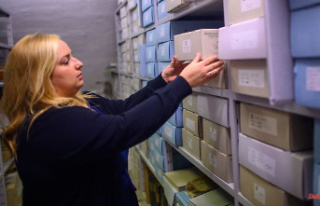A digital offensive is required for schools. The expectations are high. However, an expert report does not see clear evidence that the use of digital media leads to really better performance. A teachers' association also wants to talk about limits and mistakes.
Düsseldorf (dpa/lnw) - According to an expert report, the increased use of digital media in schools has not been accompanied by significantly better learning results. According to an analysis commissioned by the Philology Association of North Rhine-Westphalia, there were some "speculative, if not utopian, projections about the beneficial effects of digitization" in the political debate. The Heidelberg educator Karl-Heinz Dammer writes that it is undisputed that schools also have to face up to digitization. However, the extent and exact direction of digitization in schools should be discussed "open-ended".
The educator emphasized that the previous "empirical results on learning effects are by no means as clearly positive as they should be to adequately justify the demand for comprehensive digitization". According to Dammer, even those who "fundamentally demand digitization of schools" cannot avoid the sobering conclusion that increased digitization has not yet led to better learning results". Research on the effects of learning with digital media is not yet sufficient, said the expert from the Heidelberg University of Education.
Dammer has taken a look at the digitization strategy of German education policy and, according to his own statements, is primarily referring to the goals of the state of North Rhine-Westphalia and the Conference of Ministers of Education (KMK). Specifically, it is about an "Impulse Paper II" by the NRW Ministry of Education (2022) and KMK recommendations for "teaching and learning in the digital world" from the end of 2021.
The state chair of the Philologists' Association (PhV NRW), Sabine Mistler, warned: "We not only have to talk about the undisputed advantages and opportunities of digitization, but also name its limits and undesirable developments." The use of digital media and methods must be accompanied scientifically in order to "determine the actual benefit". She called for "an honest and open discourse - without wanting to slow down or block developments". The association represents teachers at grammar schools and comprehensive schools.
The PhV NRW commissioned the report in the spring of 2022 in order to look at the topic of school digitization "with pedagogical glasses", Mistler told the German Press Agency. So far, however, the debate has often focused primarily on data protection, technical or work-economic aspects. "But the question of what digitization does to students and teachers is rarely, if not not at all, addressed."
In his analysis, Dammer writes that students should be able to master the use of digital media as a new cultural technique. Their use can be very enriching for the classroom. From his point of view, however, it also has its limits: For example, the use of digital media is more difficult for complex tasks.
And: "The teacher, as the person who structures and directs the lesson, cannot be replaced by any medium," emphasized Dammer, who used to be a teacher himself. Above all, underperforming children and young people need teachers who "help them to build up cognitive structures to understand the subject matter".
A recent IQB education trend presented by the KMK shows that fourth-graders in NRW have clearly fallen behind in their skills in German and maths in a five-year comparison. In the meantime, about one in five people does not achieve the minimum standard in reading before the transition to secondary school. Every third fourth grader has significant problems with spelling.












